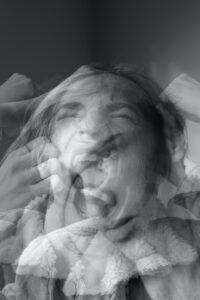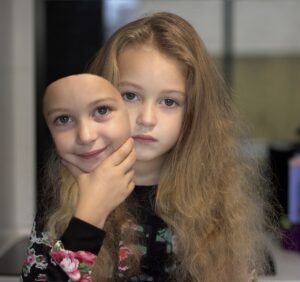By John A. Baron
“Our voice is a mask because it helps us express ourselves, it helps us share who we are inside, but it is still just a projection . . . .” Rébecca Kleinberger
Masks have fascinated cultures and individuals for centuries. In ancient Greek plays, masks were thought to embody the spirit of the character that the actor played. It was as if the mask itself used the actor to bring the character it represented back to life. The actor could often feel overtaken by the character of the mask. The voice of the actor in the here and now expressed the spirit of the character portrayed.
But a mask is more than the physical material, be it leather, Papier-mâché, or terra cotta. It is a representation of the person in appearance and voice. How many disguises live in our voice, our sounds, and sayings? Our manipulations, politicking, false enthusiasms, cover-ups, obfuscations, insincerities, compromised agreements? How do these actually sound? How do we hear them in ourselves as we do in others?
The Human Voice is a Mask
The human voice is more than a technical instrument, more than a vehicle to express words waiting to be said. Researchers can and do gain insight into how the voice works by studying articulation, breathing, movements of the vocal folds, etc. And their studies aid our work in all aspects of human life (physical, emotional, spiritual). And while these studies are essential, and perhaps at times necessary, technical analysis alone doesn’t paint a complete picture. As somatic therapists/educators, we know that the voice reflects the state and being of the speaker, connected or otherwise. It reflects the entire being, the Self, including what is conscious and visible and what is shadowed and unconscious, shifting silently below the surface until “voiced”.
What do the sounds of human voices hide or reveal?
Our voice can be molded to fit our feelings, be it frightened, nervous, joyful, excited, or even bored. But it can also betray our most profound truth, silent in the wings: a crack, an unexpected high shrill, a stumbling over words. We have the sense that we can control what we say and how we say it, but the reality is that our voices are layered, and textured. They perform as expected, and at times they break free and reveal our truth, perhaps at times much to our embarrassment or disgrace.
Without wearing actual physical masks, we put on voices to fulfill the demands of roles we find ourselves in, be it the stern father or the concerned mother, the loving partner or jovial comrade.
How then do we sound in these roles?
The mask of the roles may become evident to us when we play them. But what happens when the role or mask takes over? When we are unaware of this happening (others may be, though)? When we become lost in them, what then? Lost or found in a role, our voices will express our true feelings in many different ways, like it or not.
Voice expresses spirit
Words take on a new dimension when the sounds behind words – intonation, emotion, pitch, tempo – are enlivened or deadened.
Not everyone will be familiar with the phrase ‘Voice Confrontation.’ Most will be familiar with its meaning. It refers to the dislike of the sound of our own voice. There is a technical explanation for this. When we hear the recorded sound of our own voice, it is without the bone conduction sounds we hear when speaking. So, a recording doesn’t sound quite the same to us as we sound to ourselves when we speak. But there may be a more veiled explanation for voice confrontation: we don’t like the sound of our voice when our sound sounds phony to us. Why? Because then we have to admit we are phony.
Vocal phoniness is an indication that vocal masks are at play. When that is the case, what are vocal masks hiding?
‘Phony’ is a loaded word, one most of us have a strong adverse reaction to. It implies, false, B.S., sham, pseudo, manipulation, and affectation. But also consider these possibilities: unconscious, unintended, habit, buffering, defense, suppressed emotion, insecurity, and nervousness. Then, phoniness takes on another dimension, a more human one.
Perhaps we don’t like how we sound when the vulnerabilities hiding behind our voice masks are revealed. The tightening of the throat, holding of one’s breath, and pushing of sound, are just some examples/ manifestations of how we camouflage/ armor what we don’t want others to see or hear. If the sounds we make doing this resemble croaky adolescents, then the way we mask our vulnerabilities becomes obvious.
“I sometimes hold it half a sin, to put in words the grief I feel, for words like nature half reveal, and half conceal the soul within.”
A.L. Tennyson
Voice masks
To read the complete article, please click here
Photo Credits
Stefan Keller from Pixabay
Dimitris Vetsikas from Pixabay
Maggy Burlet from Pixabay
Callum Skelton on Unsplash











